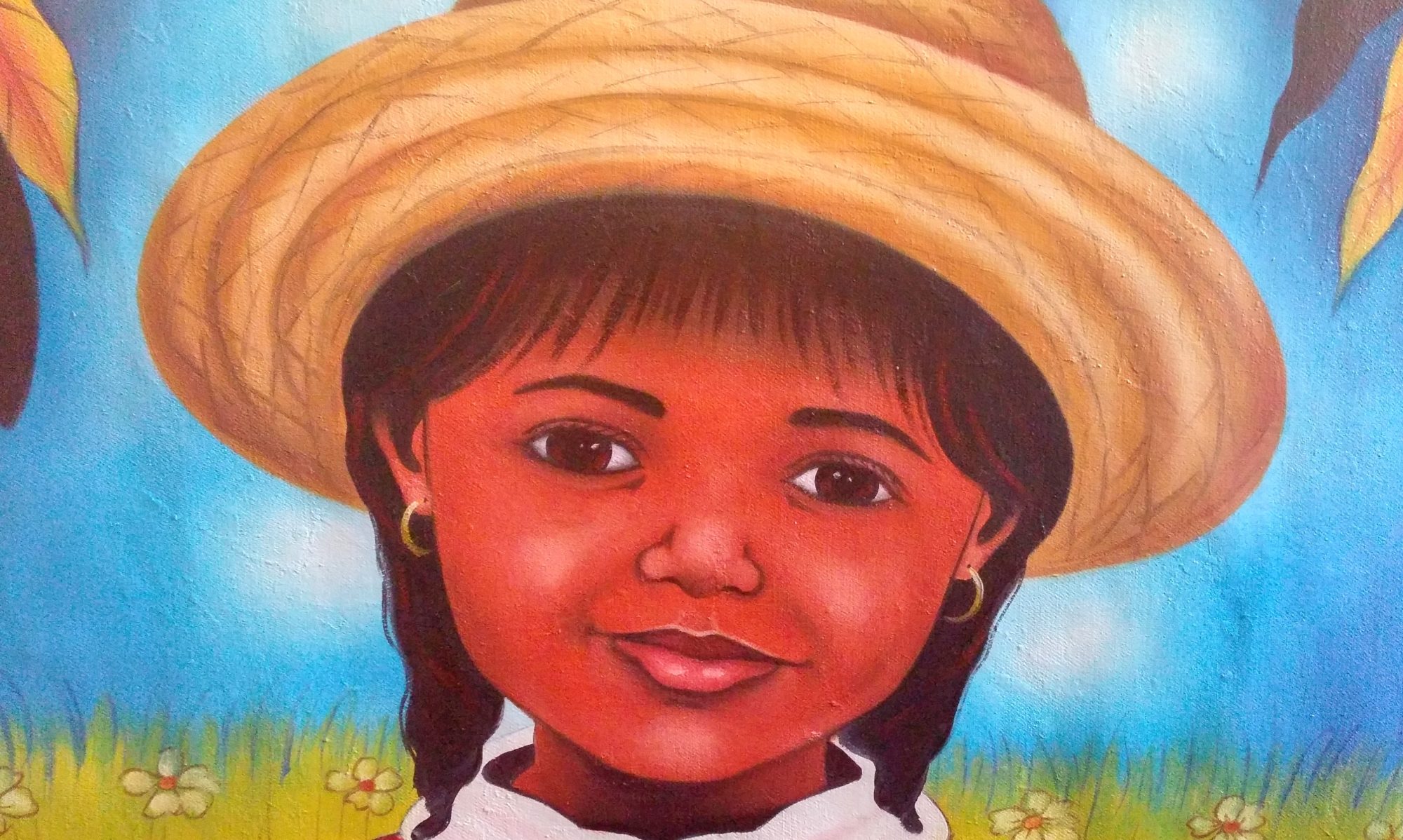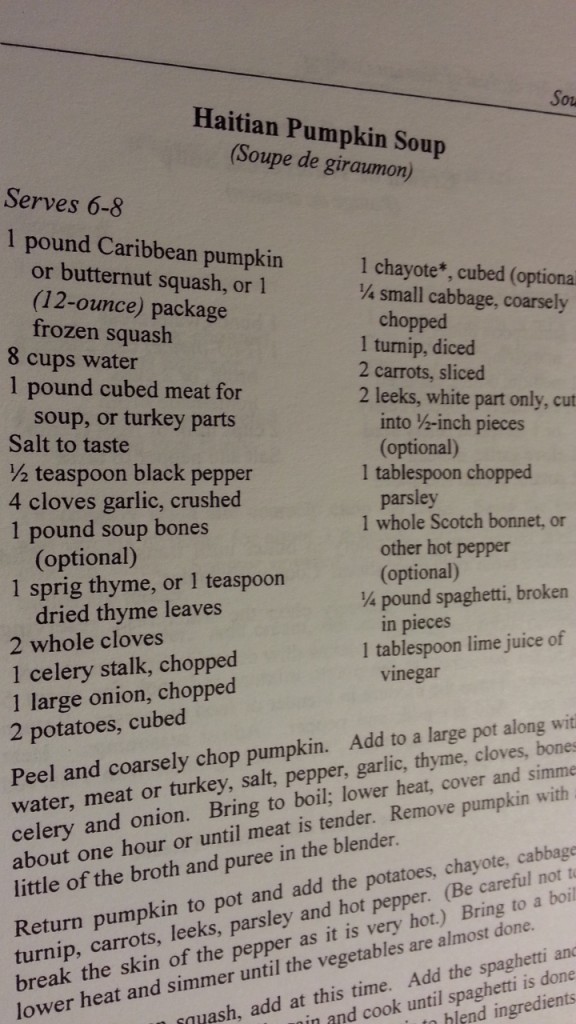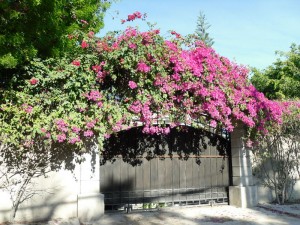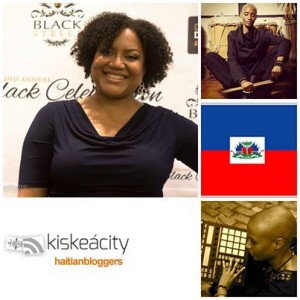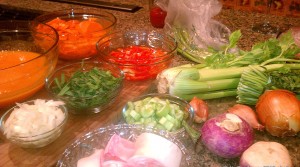 Here we go again, scratching our heads, and wandering how much pepper to add to the broth. Should we puree the pumpkin? Should we leave a few lumps in for texture? Do we use beef, goat, turkey, or pork? Do they even put pork in pumpkin soup? And what about those uppity Clerveaux cousins from Terre Haute who will spend January First with us? They’re vegetarians. No. Vegans! Great. There goes the main course.
Here we go again, scratching our heads, and wandering how much pepper to add to the broth. Should we puree the pumpkin? Should we leave a few lumps in for texture? Do we use beef, goat, turkey, or pork? Do they even put pork in pumpkin soup? And what about those uppity Clerveaux cousins from Terre Haute who will spend January First with us? They’re vegetarians. No. Vegans! Great. There goes the main course.
As for the Canarsie Fugee-wannabe cousins, what should we do? They won’t even glance at the golden freedom inside their Sunday-Guest bowls. They’ll probably bring pizza and bottles of twist-top wine. I have to give them credit, though. Those Canarsie cousins did come up with a popular hit; didn’t make a dime, but their faces wallpaper the Internet–even today.
Over in Ukraine, down in Argentina, Johannesburg: people, grown people, can’t stop singing my cousins’ song. They say President Obama himself was caught doing the dance. So, what chance does my pumpkin soup have against that? Even as I write this, the song is playing in my own head like a virus that won’t be contained. Admit it. You’ve done the moves yourself. Schoolchildren in Port-au-Prince are singing and dancing as we speak: ‘I’m sexy & gluten free.”
Enough!
Is this the end? After two hundred and 10 years of constant struggle to help us remember valuable morsels of the culture we’re not supposed to forget (or sell to the highest bidder), this is how we behave at table?
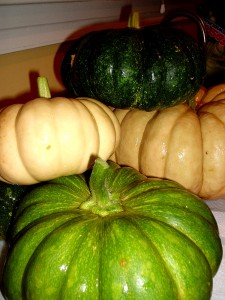 Some might say: Relax, it’s just dinner, people! It’s just one meal. But you see, Pumpkin Soup is more like fireworks on July 4th; it’s the chocolate heart on Valentine’s Day; it’s the turkey on your Thanksgiving table; the decorated tree for Christmas; it’s the ring at a wedding, the corpse at a funeral, the smoke at the Vatican announcing they’ve found a new Pope at long last; it’s Inauguration Day; it’s green on Saint Patrick’s Day; it’s the Superbowl, the World Series, and the World Cup all rolled into one. Haitian Pumpkin Soup on January First is the Big Bang of Haitian cuisine.
Some might say: Relax, it’s just dinner, people! It’s just one meal. But you see, Pumpkin Soup is more like fireworks on July 4th; it’s the chocolate heart on Valentine’s Day; it’s the turkey on your Thanksgiving table; the decorated tree for Christmas; it’s the ring at a wedding, the corpse at a funeral, the smoke at the Vatican announcing they’ve found a new Pope at long last; it’s Inauguration Day; it’s green on Saint Patrick’s Day; it’s the Superbowl, the World Series, and the World Cup all rolled into one. Haitian Pumpkin Soup on January First is the Big Bang of Haitian cuisine.
We’re not asking our nouveaux Haitians born in the Diaspora to take up machetes and run toward the unknown. We’re not telling them to hunt for wild fowl in Prospect Park. It is not our intention to distract anyone from their long but noble sword fight with NinjaX; we don’t want them to get ‘apprehended’ for one little indiscretion on Grand Theft Auto. The last thing we want is to cause our beloved to lose a precious life in their video games.
It doesn’t matter how long we’ve been outside the mother country, our nouveaux children must know who they really are. We can’t be the only ones carrying memories. All of us need to do our part. When one of us forgets, the rest has already forgotten. What would happen if for Halloween Americans decided to carve turkeys (instead of pumpkin) and scatter them around the yard?
Boo!
 Let’s focus on our own cultural legacy. As New Year’s Day 2014 advances towards us like a comet, unless we figure this soup thing out now, I see quiche on the table. Boo!
Let’s focus on our own cultural legacy. As New Year’s Day 2014 advances towards us like a comet, unless we figure this soup thing out now, I see quiche on the table. Boo!
Yes, you just had the same thought. Wonderful. We’re kindred spirits. Or something. So, let’s discuss the solution:
Uppity cousins aside. Done.
The first step to concocting your best pumpkin soup is self-emancipation from the rumor that you can’t do it. There are a thousand ways to make pumpkin soup, but some people will tell you their way is the bestest. Next time someone disparages your attempt, invite that person to try to come near your grandmother’s macaroni au gratin with a ten-foot maswife pole. See how long it takes before they put down their diamond-studded spatula to give respect where it is due.
Every hero has his own super power; but, you don’t need one to make your ancestor’s favorite food. Pumpkin soup is the legacy of all Haitian people. A little help never hurts, but no one will make a better tureen of pumpkin soup than YOU. And, yes, it will taste different than everyone else’s. This is what makes it special.
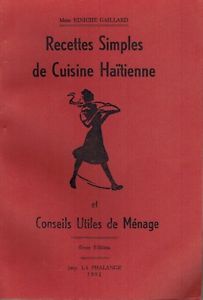 There is no denying that the original (and ultimate cookbook) is a living document lodged in your grandmother’s heart. If you are fortunate enough to be able to access that resource, congratulations! If you need a different source of information, open the pages of the invaluable Recettes Simples de Cuisine Haitienne–if you possess one. If not, there’s always The Art and Soul of Haitian Cooking. It’s a hard book to find, but it’s out there. The Haitian Institute in Washington, DC published the book in 2001, before being Haitian became a clever selling point.
There is no denying that the original (and ultimate cookbook) is a living document lodged in your grandmother’s heart. If you are fortunate enough to be able to access that resource, congratulations! If you need a different source of information, open the pages of the invaluable Recettes Simples de Cuisine Haitienne–if you possess one. If not, there’s always The Art and Soul of Haitian Cooking. It’s a hard book to find, but it’s out there. The Haitian Institute in Washington, DC published the book in 2001, before being Haitian became a clever selling point.
Pumpkin soup recipe from THE ART and SOUL of HAITIAN COOKING, was published in 2001 by The Haitian Institute–a non-profit organization established in 1987 to promote Haitian Culture and society at home and abroad.
The Art and Soul of Haitian Cooking is rich with recipes, proverbs, and masterful works of art. This beautiful book is a valuable resource for every Haitian-cuisine lover. In it we find recipes for all the food which our grand- and great-grand parents prepared. Of course, they did not need cookbooks.
So, the next time you want to make pumpkin soup, Diri djondjon, Trip (Gras Double), Herring and sauce over boiled plantains, open the Art and Soul.
Christmas 2013 may have ended, but the future is not yet here. Nouveaux Haitians, their children’s children will need to know the only ingredients that can make them feel whole. The Art and Soul of Haitian Cooking will help them learn the gastronomic aspect of our culture. Bon Appetit. And for those who remember the cryptic message contained in just two letters: “Aa,” bravo.
If you almost forgot, “Aa” was the message sent to the Palais of Sans Souci on the occasion of a very important–decisive–dinner. Grand a petit!
